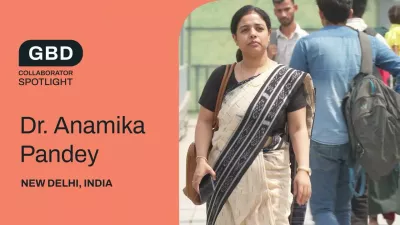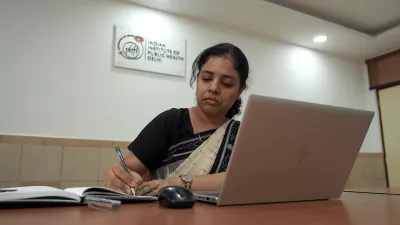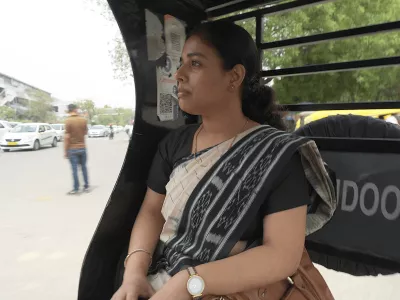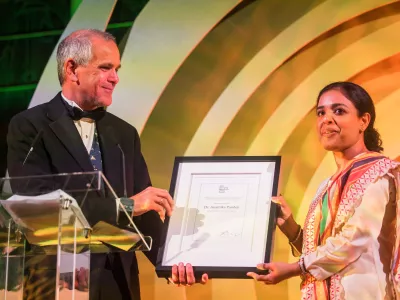Issue 04 Dr. Anamika Pandey
Published December 18, 2023

"I strongly believe that the inequality in health due to factors amenable to policy interventions is truly unfair and should be addressed." - Dr. Anamika Pandey, Public Health Foundation of India, GBD Collaborator
Dr. Anamika Pandey is the winner of the second annual Global Burden of Disease Emerging Researcher Award. This interview was conducted before she received that award, and has been lightly edited and condensed for clarity.
What first piqued your interest in working in global health?
I have always had a calling for helping people and wanted to pursue a career that would help me to fulfill my passion. One thing that has constantly perturbed me is the widespread disparity that exists in different walks of life, particularly in health. Inequity in health outcomes and health care access across individuals and communities intrigued me and compelled me to ask questions as to why such disparities exist and why are we not able to bridge these gaps in spite of the fact that health has been the top agenda since India’s Independence.
I strongly believe that the inequality in health due to factors amenable to policy interventions is truly unfair and should be addressed. The importance of improving health and achieving equity in health at large made me interested to work in the field of global health. Working in global health is indeed a very satisfying feeling as it provides ample opportunities to make differences in the life of vulnerable populations and improve the health of communities through research. I am thankful to the Public Health Foundation of India that opened the doors for me to work on diverse public health issues pertinent not only in India but also across the globe.
Can you tell me a little more about your career path and how it led to your current role at the Public Health Foundation of India? How did you decide to pivot from economics into public health?
Public health is a diverse discipline that allows people from different backgrounds, both medical and non-medical, to work in. I developed a keen interest in public health research while I was working on my dissertation, entitled “Impact of air pollution on human health in Varanasi,” way back in 2008, as part of my master’s in economics. This was my first exposure to conducting research that gave me an opportunity to learn how data can be used to quantify the magnitude of a health-related problem.
The entire exercise of generating evidence to understand the extent of the adverse health impact of air pollution was an enriching and satisfying experience. This motivated me for the transition from economics to public health.
I strongly believe that the inequality in health due to factors amenable to policy interventions is truly unfair and should be addressed.
After completing my master’s degree in economics from Banaras Hindu University, Varanasi, I pursued a Master’s in Population Studies from the International Institute for Population Sciences, Mumbai, to acquire the necessary competencies and knowledge to work in the field of public health. As part of this master’s program dissertation, I focused on understanding how the New Economic Policy of India, introduced in the early 1990s, had an impact on child malnutrition. My work was well appreciated, which was very encouraging for me and motivated me to continue working in the area of public health.
I worked on a few research projects and papers on diverse topics after completing my master’s degree at the International Institute for Population Sciences. I then pursued my PhD in Epidemiology and Population Health from the London School of Hygiene and Tropical Medicine as part of the Public Health Foundation of India–UK Consortium Wellcome Trust Capacity Building Programme. This helped me to gain further expertise in conducting research. My PhD thesis focused on understanding the socioeconomic inequality in health care utilization and expenditure in the older population of India.
After completion of my PhD in 2017, I have been working as Research Associate at the Public Health Foundation of India on GBD India analysis and publications.

Dr. Pandey specializes in researching the impact of air pollution on health at the Public Health Foundation of India.
When did you first learn about the Global Burden of Disease Study (GBD) and what made you interested in taking part in the research process?
My first exposure to the GBD study was during my PhD from the London School of Hygiene and Tropical Medicine as part of the Public Health Foundation of India–UK Consortium Wellcome Trust Capacity Building Programme. Prof. Lalit Dandona, who is the Director of the India State-Level Disease Burden Initiative, was my PhD supervisor in India. I had the opportunity of attending the launch event of this Initiative, the dissemination of the India report on detailed disease and risk factor trends in every state of India, and the disease-specific papers which introduced me to the GBD study.
Having worked with several large-scale survey data available in India and knowing that each of these have their own limitations in terms of comparability over time and across groups, I was fascinated by the concept of using all available data in a systematic framework to produce robust and comparable estimates of burden from hundreds of diseases, injuries, and risk factors over a large period of time for countries across the globe. Another aspect that grabbed my attention was that the GBD approach keeps evolving and the estimates are refined through the inclusion of new available data.
I was intrigued to learn more about the GBD approach. After completing my PhD in 2017, I was fortunate to get an opportunity to work with the India State-Level Disease Burden Initiative and use GBD India data to pursue research in the two important areas – malnutrition and air pollution – that are of particular interest to me.
The relatively less developed states of the country are most vulnerable to the adverse impacts of air pollution.
You've conducted a fair amount of air pollution research over the years. What findings from the GBD 2019 paper surprised you the most?
The findings from the GBD India air pollution economic impact paper that surprised me the most was the magnitude of the adverse economic impact of air pollution in India and the wide variations in it across the states of India. Although I had a sense that air pollution has a major impact not only on health but also on the economy, I was alarmed to learn that the economic loss due to lost output from premature deaths and morbidity from air pollution is huge in India, amounting to US$36.8 billion, equivalent to 1.4% of the country’s GDP.
Imagine the magnitude of economic benefits India can reap by investing further in air pollution control strategies. I was also startled to learn that the relatively less developed states of the country are most vulnerable to the adverse impacts of air pollution.
Do you know if policymakers have used your research findings to adopt state-specific strategies to reduce air pollution?
Findings from this paper are timely and relevant for India’s intent of reducing air pollution facilitated by air pollution control strategies titrated to the conditions and context of each state, which will substantially benefit both the health of the population as well as the economy across the country. This paper was well-received by policymakers and was discussed widely in the media and news articles. This paper has received much attention in the research community as well and has added to the ongoing discussion on the adverse impacts of air pollution.
Dr. Pandey's research focuses on the economic and health impacts of air pollution in India.

What has been the most rewarding project you have worked on in your career and why?
I certainly learned something from each of the projects that I have worked in my career, but if I have to choose one it would be the India State-Level Disease Burden Initiative. This project gave me an opportunity to broaden my perspective on how multiple data can be integrated with sound scientific methods to generate robust evidence in the most effective manner.
Working in this project has been a great learning experience, which has helped me to strengthen my research and technical skills, work on diverse public health issues, and achieve professional accomplishments. This collaborative work has provided me with ample opportunities to learn about teamwork, communication both verbal and written, coordination, and the importance of making and sticking to a plan.
What impact do you hope your work will have on the communities you study?
I believe that my research work would add to the existing knowledge and will sensitize the discourse on important public health issues by generating most up-to-date robust evidence. The evidence generated from my research work would contribute to improving the health of the population by informing public health decisions toward further development of targeted approaches. The disaggregated findings would help in the planning and implementation of local action plans setting the course for further reduction in disparities in health outcomes, leading to overall improvement in the health of population across India.
Congratulations on receiving the 2022 GBD Emerging Researcher Award! As a woman leading important and impressive research, what advice would you give to other early-career female researchers?
Thank you! My recommendation is to be open and do not set stringent boundaries in your career path. Setting up a goal and being focused on it is good but remember not to be so engrossed that you lose track of the environment and world around you. There are lot of areas to be explored, new paths to tread, and new ideas to be generated, so be open to everything that comes your way and think about new ways to help the world with whatever you do.
There are immense opportunities in the area of public health research. Young female researchers have the responsibility of bringing the research on women’s health to the forefront and broadening the approach to women’s health and well-being as this has been a neglected area for far too long. I think more and more women researchers should take up leadership roles in global public health and should create an environment that would facilitate women’s participation and enable them to reach their full potential.
Dr. Anamika Pandey was the second annual recipient of the GBD Emerging Researcher Award.

What are your favorite things to do in your free time outside of work?
I am a nature lover and I like to spend time deepening my connection with nature. Whenever I have time, I prefer travelling to picturesque natural locations. It soothes both the body and mind and is the best escape for me from the busy urban life. I am very much fond of spending time with my two-year-old daughter, who is my best travel partner these days.
What are three books you’d recommend, and why?
Invisible Women: Exposing Data Bias in a World Designed for Men by Caroline Criado-Perez: It is a fascinating and enlightening read. The book is excellent, and I recommend it for being substantive and research-based. It is an essential book in striving to build a more equal world.
Good Economics for Hard Times: Better Answers to Our Biggest Problems by Abhijit V. Banerjee and Esther Duflo: The book provides a grounded approach to tackling today’s most crucial global problems. I recommend this book as it shows how economic reasoning and evidence can explain real-world issues.
The Status Syndrome: How Social Standing Affects Our Health and Longevity by Michael Marmot: This is a groundbreaking book that highlights that the control over life and social connectedness, rather than actual financial resources or access to medical services, have the most profound impact on health and life expectancy. I would recommend this book as it gives a whole new perspective of looking at the inequality in health outcomes beyond that explained by poverty, traditional risk factors, and access to health care.
Thanks for taking the time to answer these questions, Dr. Pandey! Anything else you’d like to tell our readers?
Thank you. I am pleased to be a part of the GBD spotlight series. I would like to share my mantra of achieving excellence in what you do. I strongly believe that staying focused, working diligently, being passionate about your work, and maintaining childlike enthusiasm plays a pivotal role toward achieving your goals.